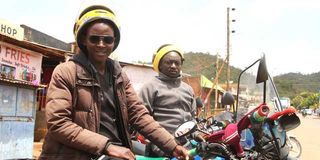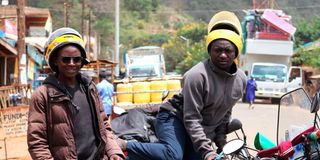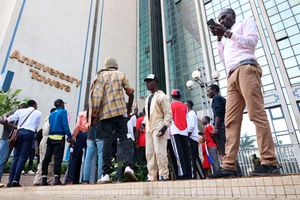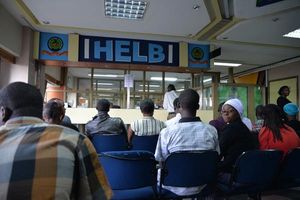
Boda boda operator Daniel Kimanthi waits for clients at Kwavonza Township in Kitui County on March 13, 2025. He is a chemistry and mathematics teacher who has graduated recently from the South Eastern Kenya University (Seku) which is located in the area.
A rider flashes the headlight of a custom-modified motorbike to attract clients from a makeshift shed in Kwavonza, Kitui County.
The boda boda is Daniel Kimanthi, who graduated recently as a chemistry and mathematics teacher from South Eastern Kenya University (Seku).
Six months after graduation, Kimanthi is among a growing community of Seku graduates and students who run small businesses in the town.
“The certificate is safe at home but I must work and earn a living. I have turned down three teaching job offers because of the low pay,” Kimanthi tells Higher Education.
The high cost of living has pushed Seku students and graduates into business. Most say support from the Higher Education Loans Board (Helb) is not enough to sustain them.
The entrepreneurial bug hit Kimanthi in his third year of study. He invested his Sh16,000 student loan in a three-month-old calf, which he sold for Sh56,000 eight months later.
Also Read: Confessions of a campus hustler
Kimanthi used the amount to acquire a second-hand motorcycle, which he was to use to cover the 17 kilometres from Kwavonza and Seku.
Good business
An idea hit Kimanthi on the day he pocketed Sh500 by taking students to campus. He never looked back.
“I can make up to Sh2,000 on a good day,” Kimanthi says.

Boda boda operator Daniel Kimanthi waits for clients at Kwavonza Township in Kitui County on March 13, 2025. He is a chemistry and mathematics teacher who has graduated recently from the South Eastern Kenya University (Seku) which is located in the area.
At least 200 current and former Seku students are boda bodas in Kwavonza and its environs.
“Students make up the biggest number of boda boda clients in Kwavonza. They prefer being ferried around by colleagues,” says Joram Mutugi, a student who is also in the boda boda business.
University students and graduates also run eateries, grocery stalls, used shoe and clothes businesses, pool tables, cybercafes and repair electronic devices.
One graduate makes furniture while at least 10 others operate hair salons and nail parlours in Kwavonza.
“University students are the backbone of business in Kwavonza, forming a solid customer base especially after they get the Helb money,” Kwavonza Business Community chairman, Pius Mwanzia, says.
“The resulting business boom has led to a rise in rent. Unfortunately, we are also hit hard with the students go on long holidays.”
The university has grown rapidly over the years, Dr Faraj Yatundu, the head of marketing at the university, told Higher Education during the inaugural Seku Soko Day
“The student population has crossed the 10,000 mark. The expansion means some students reside outside the university. Kwavonza is the obvious choice because of its proximity to Seku. The university is deliberate in promoting entrepreneurship among students.”
The day was created by the university to help students sell their wares and create networks.
Positive impact
Vincent Mayeka, a fourth year Mechanical Engineering student who works at a cybercafé, says entrepreneurship makes students responsible.
“They may not make a lot of money but the little we get goes a long way in supplementing the loans. We don’t have to keep calling our parents, relatives or friends back home for money. Working also ensures we remain busy in between studies,” he says.
However, talking to students running businesses in Kwavonza reveals many challenges. Juggling work and studies is no mean feat.
“Concentrating in class is tough after riding and calling out for passengers for hours. A call by a high-value client could mean an end to a lecture, which ultimately may compromise one’s studies. A high-level of discipline is needed for one to succeed in studies and entrepreneurship,” says Mutugi who traces his business journey to 2020 when he was a hawker in Meru town.
He operated an eatery in Kwavonza before plunging headlong into the boda boda industry.








